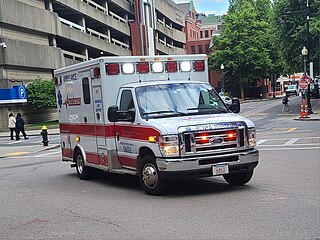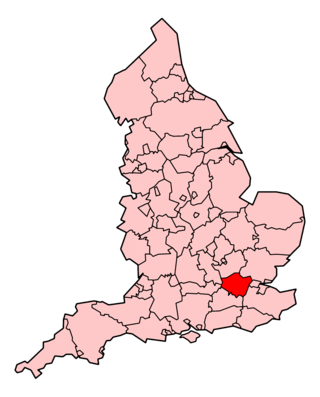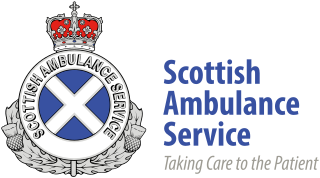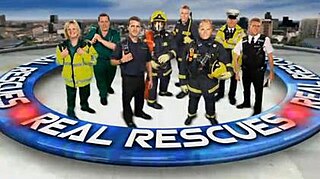
An ambulance is a medically equipped vehicle used to transport patients to treatment facilities, such as hospitals. Typically, out-of-hospital medical care is provided to the patient during the transport. Ambulances are used to respond to medical emergencies by emergency medical services (EMS), and can rapidly transport paramedics and other first responders, carry equipment for administering emergency care, and transport patients to hospital or other definitive care. Most ambulances use a design based on vans or pickup trucks, though others take the form of motorcycles, buses, hearses, aircraft and boats.

Medical evacuation, often shortened to medevac or medivac, is the timely and efficient movement and en route care provided by medical personnel to wounded being evacuated from a battlefield, to injured patients being evacuated from the scene of an accident to receiving medical facilities, or to patients at a rural hospital requiring urgent care at a better-equipped facility using medically equipped air ambulances, helicopters and other means of emergency transport including ground ambulance and maritime transfers.

Emergency! is an American action-adventure medical drama television series jointly produced by Mark VII Limited and Universal Television. Debuting on NBC as a midseason replacement on January 15, 1972, replacing two situation comedy series, The Partners and The Good Life, it ran for a total of 122 episodes until May 28, 1977, with six additional two-hour television films during the next two years, 1978 and 1979.

A paramedic is a healthcare professional, providing pre-hospital assessment and medical care to people with acute illnesses or injuries. In Canada, the title paramedic generally refers to those who work on land ambulances or air ambulances providing paramedic services. Paramedics are increasingly being utilized in hospitals, emergency rooms, clinics and community health care services by providing care in collaboration with registered nurses, registered/licensed practical nurses and registered respiratory therapists.

London's Air Ambulance Charity is a registered charity that operates a helicopter emergency medical service (HEMS) dedicated to responding to serious trauma emergencies in and around London. Using a helicopter from 08:00 to sunset and rapid response vehicles by night, the service performs advanced medical interventions at the scene of the incident in life-threatening, time-critical situations.

The London Ambulance Service NHS Trust (LAS) is an NHS trust responsible for operating ambulances and answering and responding to urgent and emergency medical situations within the London region of England. The service responds to 999 phone calls across the region, and 111 phone calls from certain parts, providing triage and advice to enable an appropriate level of response.
Angela Mellissa Griffin is an English actress, television presenter and director who has been active on British television since the early 1990s. She is best known for portraying the roles of Fiona Middleton in the ITV soap opera Coronation Street, Kim Campbell in the BBC One school-based drama series Waterloo Road, and DS Lizzie Maddox in the final two series of ITV's detective drama series Lewis (2014–2015). Griffin was also an original cast member of Holby City, playing nurse Jasmine Hopkins (1999–2001).

The Scottish Ambulance Service is part of NHS Scotland, which serves all of Scotland's population. The Scottish Ambulance Service is governed by a special health board and is funded directly by the Health and Social Care Directorates of the Scottish Government.

Yorkshire Ambulance Service NHS Trust (YAS) is the NHS ambulance service covering most of Yorkshire in England. It is one of ten NHS Ambulance Trusts providing England with emergency medical services as part of the National Health Service it receives direct government funding for its role.

The West Midlands Ambulance Service University NHS Foundation Trust (WMAS UNHSFT) is responsible for providing NHS ambulance services within the West Midlands region of England. It is one of ten ambulance trusts providing England with emergency medical services, and is part of the National Health Service.

Emergency medical services in the United Kingdom provide emergency care to people with acute illness or injury and are predominantly provided free at the point of use by the four National Health Services (NHS) of England, Scotland, Wales, and Northern Ireland. Emergency care including ambulance and emergency department treatment is only free to UK residents and a charge may be made to those not entitled to free NHS care.

The East Anglian Air Ambulance (EAAA) is an air ambulance providing Helicopter Emergency Medical Services (HEMS) across the English counties of Norfolk, Suffolk, Cambridgeshire and Bedfordshire. The appeal to fund the service was launched in the summer of 2000 by top jockey Frankie Dettori, who had been injured in a serious plane crash in June of that year. When flying commenced in January 2001, the service was initially available only one day a week. The East Anglian Air Ambulance operates two helicopters, 365 days a year, from its bases at Cambridge Airport and Norwich Airport, covering over 5,000 square miles (13,000 km2) and a population of approximately 3.5 million.
Emergency medical services in the Netherlands is a system of pre hospital care provided by the government in partnership with private companies.

The history of the ambulance begins in ancient times, with the use of carts to transport patients. Ambulances were first used for emergency transport in 1487 by the Spanish forces during the siege of Málaga by the Catholic monarchs against the Emirate of Granada, and civilian variants were put into operation in the 1830s. Advances in technology throughout the 19th and 20th centuries led to the modern self-powered ambulance.

Real Rescues is a British documentary broadcast on BBC One exploring the daily work of the emergency services aired from 2007 to 2013. Real Rescues was at the heart of the action with the emergency services of Hampshire including the police, fire, ambulance, coastguard and lifeboat crews. The majority of the footage was shot around Portsmouth and Fareham. In the later series, other counties from across the UK began to be featured. Other emergency services, such as mountain rescue and animal rescue, were also featured. The show was axed in 2013.
Angela and Friends is a British talk show which was produced by Crackit Productions for Sky One. The show aired at 12pm, Monday to Friday, and was presented by actress Angela Griffin, who was joined by three "friends" in each show to discuss the latest news, celebrity gossip as well as other topical issues.
Helicopter Heroes is a British daytime television series, following the lifesaving work of the Yorkshire Air Ambulance. The first episode aired on 3 September 2007, and a total of seven series have been made. The programme ceased production in 2015.

Air medical services are the use of aircraft, including both fixed-wing aircraft and helicopters to provide various kinds of urgent medical care, especially prehospital, emergency and critical care to patients during aeromedical evacuation and rescue operations.

The 1989–1990 British ambulance strike was part of a dispute over pay between ambulance crews and the government, with action lasting from 7 September 1989 to 23 February 1990. Ambulance workers were aggrieved that their pay had fallen behind that of firefighters with which it had been linked in 1985. A government pay offer of 7.5% was rejected by the five ambulance workers unions, which demanded a 25.8% rise. Union action started with an overtime ban but escalated to a full refusal of crews to attend non-emergency calls in November. The government used the British Army, volunteer ambulances and the police to mitigate the effects of the strike. A pay deal of 16.9% was reached on 23 February 1990 and the ambulance crews returned to work. The strike was regarded as a success for the union, which had carefully cultivated public opinion throughout.
Emergency Helicopter Medics is a British documentary series that follows air ambulance teams responding to life-threatening emergencies.














